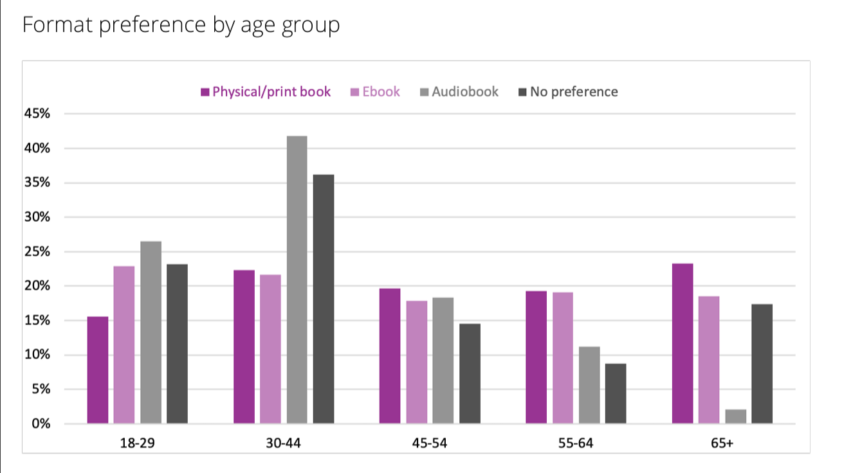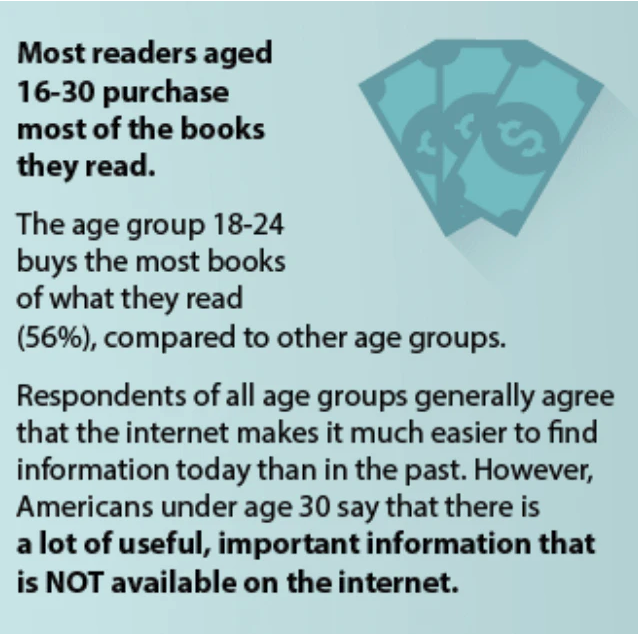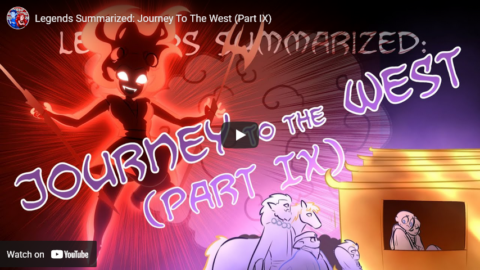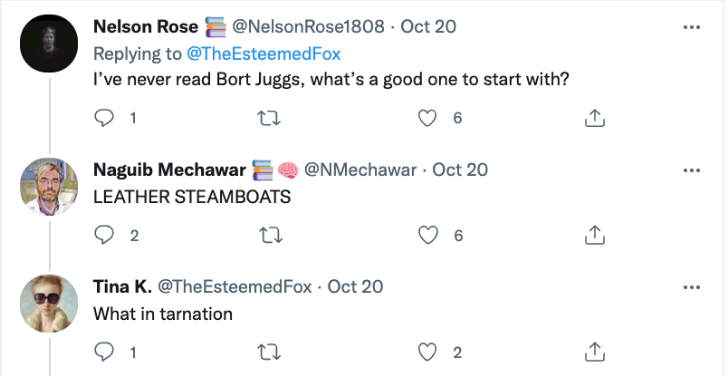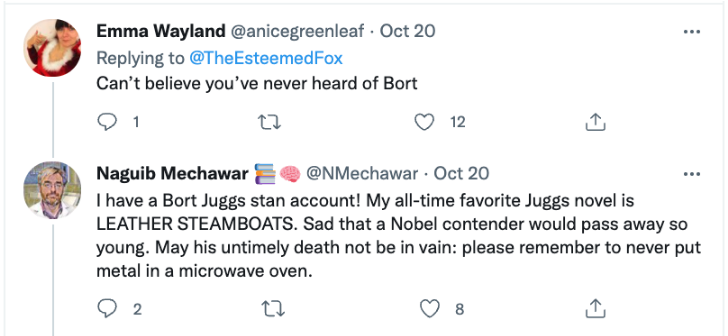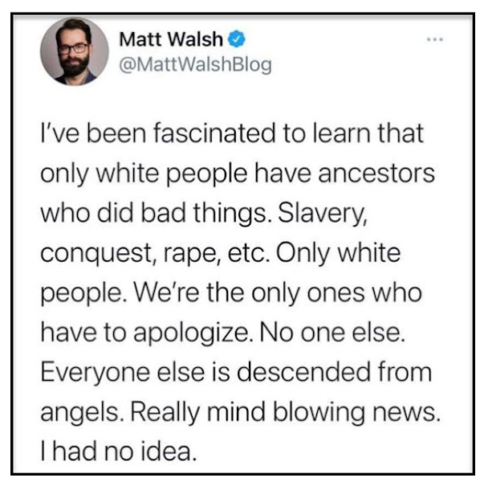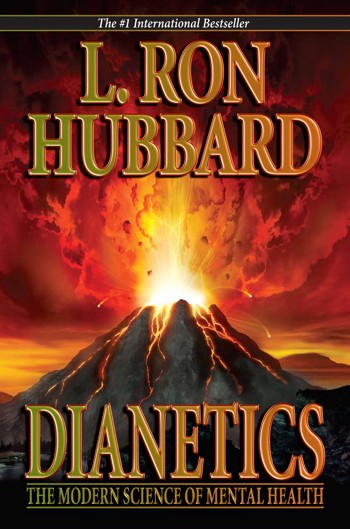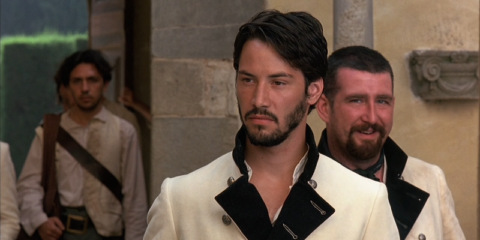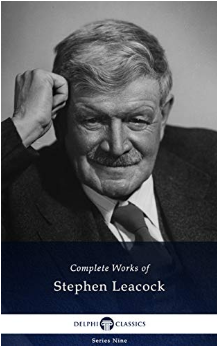The History Guy: History Deserves to Be Remembered
Published 14 Aug 2019The life of the youngest-ever winner of the Nobel Prize for literature, Rudyard Kipling, was filled with tragedy. He survived a difficult childhood to go on to become one of the most celebrated authors of his day, penning such classics as The Jungle Book and Just So Stories. But only one of his children would survive him and his legacy has been tied to some of his out-dated political beliefs. The History Guy remembers the tragic life of Rudyard Kipling.
(more…)
September 5, 2022
The Tragic Life of Rudyard Kipling
September 4, 2022
Who was reading during Plague Year Two, and what format did they prefer?
In the latest edition of the SHuSH newsletter, Kenneth Whyte summarizes some of the findings of the most recent Booknet survey:
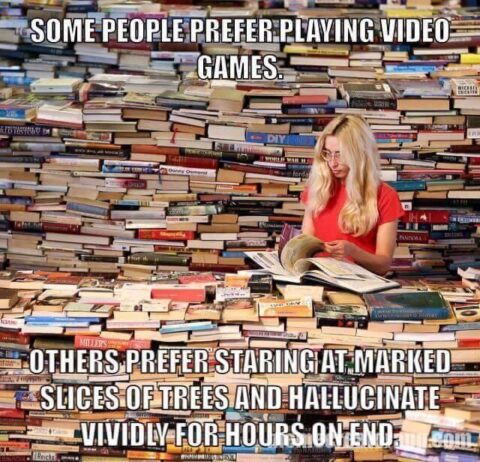
H/T to Marc Adkins who shared this meme at the perfect moment for me to steal it, file off the serial number and repost it here.
A few months ago, BookNet Canada, which does a lot of valuable research into the book market, released the 2021 edition of its annual survey of Canadian leisure and reading habits. It’s always an interesting study. I was slow getting to it this year because there’s been so much else going on. Here are the ten most interesting findings.
- Canadians have had plenty of time on their hands: 81 per cent report having enough or more than enough leisure. Pre-COVID, about 25 per cent of respondents said they had more-than-enough; during COVID, that jumped to about 35 per cent. The pandemic wasn’t all bad.
- Canadians read books more than they listen to radio or play video games but less than they shop or cook; 42 per cent of us (led by 58 per cent of the 65-plus crowd) read books daily; 35 per cent of the 18-29 age group read daily and 57 per cent of that cohort read at least once a week. Young people are no more likely to read books less than once a month than any other under-65 segment, which bodes well for the future of the industry.
- The statement “books are for enjoyment, entertainment, or leisure” received a ‘yes’ from 62 per cent of respondents, and a ‘sometimes’ from 34 per cent; the statement “books are for learning or education” received a ‘yes’ from 41 per cent of respondents and a ‘sometimes’ from 50 per cent.
- The top reasons for selecting a book to read are the author (40 per cent), the book’s description (30 per cent), recommendations (25 per cent), the main character or the series (20 per cent), its bestselling status (14 per cent), and reference needs (13 per cent). “Recommendations and the impact of bestseller lists have trended down from 2019 to 2021.”
- The love affair with print continues with 68 per cent of readers citing hard copies as their preferred format. Ebooks came in at 16 per cent and audiobooks at 10 per cent Interestingly, readers had a marked preference for paperbacks over hardcovers. Format preferences differ from age group to age group, with some evidence that the kids might not be keen on physical books:
I was interested in that apparent rejection of physical books by the 18-29 cohort so I looked back at the last two years of the survey […] The results are quite different, suggesting a methodological shortcoming (the survey sample is 1,282 adults so the margin of error will be large when you eliminate those who don’t read a given format, those without format preferences, and break the remainder down into five age groups).
August 9, 2022
QotD: Fusty old literary archaism
For as long as I can remember, readers have been trained to associate literary archaism with the stuffy and Victorian. Shielded thus, they may not realize that they are learning to avoid a whole dimension of poetry and play in language. Poets, and all other imaginative writers, have been consciously employing archaisms in English, and I should think all other languages, going back at least to Hesiod and Homer. The King James Version was loaded with archaisms, even for its day; Shakespeare uses them not only evocatively in his Histories, but everywhere for colour, and in juxtaposition with his neologisms to increase the shock.
In fairy tales, this “once upon a time” has always delighted children. Novelists, and especially historical novelists, need archaic means to apprise readers of location, in their passage-making through time. Archaisms may paradoxically subvert anachronism, by constantly yet subtly reminding the reader that he is a long way from home.
Get over this adolescent prejudice against archaism, and an ocean of literary experience opens to you. Among other things, you will learn to distinguish one kind of archaism from another, as one kind of sea from another should be recognized by a yachtsman.
But more: a particular style of language is among the means by which an accomplished novelist breaks the reader in. There are many other ways: for instance by showering us with proper nouns through the opening pages, to slow us down, and make us work on the family trees, or mentally squint over local geography. I would almost say that the first thirty pages of any good novel will be devoted to shaking off unwanted readers; or if they continue, beating them into shape. We are on a voyage, and the sooner the passengers get their sea legs, the better life will be all round.
David Warren, “Kristin Lavransdatter”, Essays in Idleness, 2019-03-21.
June 25, 2022
Kenneth Whyte announces the Sutherland House Prize
If the Canada Council for the Arts — the most important prize-awarding organization in Canadian literature — decides to ignore the majority of works of history in their award schemes, what can the Canadian literary community do about it? Sutherland House reacts by creating their own prize for those works deemed no longer prize-worthy by the Canada Council:
Almost from the start of this newsletter in May 2019, we’ve been concerned with the crisis in Canadian nonfiction publishing.
It began with our realization (SHuSH 10 and SHuSH 17) that the Canada Council had decided that books relying primarily on facts as opposed to the author’s voice are not art. Personal history, personal memoir, personal essay meet the Canada Council’s standard for art and are therefore eligible for grants and awards. Objective fact-based journalism, essays, histories, biographies, business and science writing, not so much.
We were bothered by the notion that the distance an author chooses to take from a subject (first person, say, versus third-person) is what makes or breaks a work of art. Same goes for an author’s fidelity, or lack thereof, to verifiable fact.
It also seemed bonkers that a government agency like the Canada Council would bail on researched nonfiction in favor of works in which the subjective experience of the writer is primary at a time when the rest of the government was so panicked over the lack of reliable fact-based information in the public sphere that it was pumping more than $500 million into our failing newspaper chains. If Ottawa was genuinely concerned about the quality of public discourse in Canada and the information available to the electorate, it would be directing the Canada Council to rescind its policy and support fact-based nonfiction to the same levels as fiction, poetry, and personal literature.
SHuSH pursued the issue. We explained why Canada Council funding matters: most publishers in Canada would be out of business or much reduced without their grants, so they naturally produce books that keep them in the money. Researched nonfiction is expensive and time-consuming to produce at the best of times; when it’s relatively disadvantaged by arts funders, it begins to disappear. It’s no accident that the shortlists of all the major nonfiction prizes in Canada have been dominated by memoir in recent years.
(We’ve always been at pains to add that we have nothing against memoir — we publish our share — but it is no substitute for well-researched, fact-based nonfiction. We need investigative journalism, history, biography, politics, current affairs, science & health books if we’re going to understand ourselves and our times.)
May 1, 2022
Despite the ever-present smartphone, people are still reading actual books in pretty good numbers
In the latest SHuSH newsletter, Kenneth Whyte provides some mildly hopeful numbers for both readers and writers:
I was having coffee this week with a former star journalist who now (like so many) works in a journalist-adjacent industry. “Who reads books?” she wondered.
It’s a question I’m often asked by journalists who these days get a lot of their information from Twitter. The chore of keeping up with their feed leaves little time for anything else. My guest still read books and belongs to a book club, but she asked the question all the same.
According to the authorities at the PEW Institute, 77% of Americans read books in 2021 (or, to be more precise, read one or more books in one or more format—print, audiobook, ebook). That’s not bad considering only 86% of American adults can read.
Only 21% of women read no books, and 26% of men. Eighty per cent of white people read books (as compared to 62% of Hispanics).
Good news for the future of book reading: 81% of adults under the age of fifty read books compared to 72% of adults over the age of fifty.
More on the demographics: 69% of those earning less than $30,000 a year read books, while 85% of those earning over $75,000 read books; 61% of those with a high-school (or less) education read books; 89% of college graduates read books.
According to PEW, the average reader manages twelve a year.
There is some evidence that reading is a declining habit: according to the Bureau of Labor Statistics, average time spent reading for pleasure declined from twenty-three minutes a day to seventeen minutes a day from 2005 to 2017. But the least decline was among young adults, 18 to 34 (less than 1%).
In fact, there is good evidence that the much-maligned millennials read more than their parents, and they overwhelmingly prefer hard copies to digital books. Even better, the millennials pay for their books:
March 14, 2022
Legends Summarized: Journey To The West (Part IX)
Overly Sarcastic Productions
Published 26 Nov 2021Journey to the West Kai, episode 6: Two Weddings And An Asskicking
FIRST EPISODE: https://www.youtube.com/watch?v=61nuX…
PREVIOUS EPISODE: https://youtu.be/xFD_0PIfHHA
FULL SERIES: https://www.youtube.com/playlist?list…Our content is intended for teenage audiences and up.
PATREON: https://www.Patreon.com/OSP
PODCAST: https://overlysarcasticpodcast.transi…
DISCORD: https://discord.gg/osp
MERCH LINKS: http://rdbl.co/osp
OUR WEBSITE: https://www.OverlySarcasticProductions.com
Find us on Twitter https://www.Twitter.com/OSPYouTube
Find us on Reddit https://www.Reddit.com/r/OSP/
November 14, 2021
November 3, 2021
QotD: English literature
Here one comes back to two English characteristics that I pointed out, seemingly rather at random, at the beginning of the last chapter. One is the lack of artistic ability. This is perhaps another way of saying that the English are outside the European culture. For there is one art in which they have shown plenty of talent, namely literature. But this is also the only art that cannot cross frontiers. Literature, especially poetry, and lyric poetry most of all, is a kind of family joke, with little or no value outside its own language-group. Except for Shakespeare, the best English poets are barely known in Europe, even as names. The only poets who are widely read are Byron, who is admired for the wrong reasons, and Oscar Wilde, who is pitied as a victim of English hypocrisy. And linked up with this, though not very obviously, is the lack of philosophical faculty, the absence in nearly all Englishmen of any need for an ordered system of thought or even for the use of logic.
George Orwell, “The Lion And The Unicorn: Socialism and the English Genius”, 1941-02-19.
October 8, 2021
Critical Race Studies go international — “what was once considered an American eccentricity has gone global, and Britain’s curriculum engineers are doing their utmost to make up for lost time”
In The Critic, Frank Furedi looks at how quickly American elite fascination with the various incarnations of Critical Theory has spread beyond the US:
“My child has been told in a series of assemblies that she ‘has white privilege’, that she ‘subconsciously perpetuates it’, may even ‘consciously enjoy it’ and that she ought to be ‘starting to address it’. She has been shown slides of white BLM protesters holding placards that say ‘I will never understand’, told she needs to listen and educate herself and that intersectional theory shows that ‘whiteness will always insulate and protect her from racism’.”
Ten years ago, this mother’s story would likely be considered a joke; a parody of the culture wars that were starting to simmer across the Atlantic. But a lot can happen in a decade: the child whose mother recently reported the above attends an academy in London. Indeed, what was once considered an American eccentricity has gone global, and Britain’s curriculum engineers are doing their utmost to make up for lost time.
In the UK, curriculum engineers have embraced the approach of their American colleagues and are now busy targeting what they describe as outdated views and ideals. The term “outdated” serves as a euphemism for describing ideas and sentiments that do not accord with their project of distancing children from the traditions and way of life of their parents and grandparents. Under the banner of “relevance”, they wish to cancel the classics of literature and replace them with stories written by contemporary writers. Even the works of Shakespeare have been denounced for their outdated racist, antisemitic and misogynist views.
One of the most important and unremarked feature of recent developments in British classrooms is the uncritical and slavish manner with which curriculum experts imitate the cultural crusade of their American colleagues. Earlier this year it was reported that numerous American schools (including the prestigious $45,000-a-year Brentwood School in Los Angeles) were scrapping the apparently outdated To Kill a Mockingbird.
Evidently, some British curriculum leaders swiftly got the message. For example, the James Gillespie High School in Edinburgh decided that it no longer wants to teach classics like Of Mice and Men or to To Kill A Mockingbird in its English classes. The school claims that the “dated” approach to race of these wonderful novels disqualifies them from a place in the English literature curriculum.
Advocates of the project of decolonising schools target what they perceive as outdated views on issues as diverse as gender, trans culture, race and what it means to be British. School subjects as diverse as history, literature, geography and religious education are now used as vehicles for countering what they describe as “white privilege”. They encourage pupils to acknowledge their whiteness and perceive Britain as a society defined by its systemic racism.
July 10, 2021
The early growth of “Dianetics”, later known as Scientology
In Quillette, David S. Wills outlines the early years of L. Ron Hubbard’s quasi-religion that eventually turned into a full-fledged cult:
In the 21st century, Scientology has become a synonym for “cult”. Thanks to an array of investigative exposés and testimony from former members, few people in the Western world are unaware of at least some of the Church’s fantastical beliefs and more alarming behaviours. Sixty years ago, however, it was viewed quite differently. Scientology — or dianetics, as it was originally known — was an appealing idea to many intellectuals and creatives at a time when the world was rapidly changing and notions that had once been taken for granted were suddenly being tossed out of the window. In science, art, and philosophy, accepted norms were being turned on their heads, and in the 1950s and ’60s, L. Ron Hubbard’s ideas — peddled as an alternative to psychiatry — fit quite nicely among the emerging doctrines dreamed up by his contemporary thinkers.
Indeed, the original concepts that launched Hubbard’s movement were not as outrageous as those that define it today. Among these, the idea of “engrams” and the “reactive mind” were perhaps the most appealing. Hubbard theorised that humans are marked by unconscious traumas that essentially pre-determine “aberrant” behaviour. Naturally, he claimed that his organisation held the key to removing these traumas and freeing people from a great deal of suffering. Stripped down to its fundamentals, dianetics seemed to be no more implausible than the strange new ideas espoused by Freud and Jung, or even those previously espoused by Nietzsche.
Of course, there were always oddball beliefs bundled in as well, and as the years went by, these became more prominent. Hubbard — a science fiction author prior to his metamorphosis into quasi-religious guru — enjoyed adding new elements of fantasy to his central theories, layering sci-fi storylines on top of one another until his movement had become an extravagant sort of space opera. The more obvious cult-like elements would emerge in due course: charging adherents for advancement in the organisation; trapping them with manipulation and blackmail; the development of esoteric jargon known as “Scientologese” that made it almost impossible for real communication to take place between members and outsiders; and shocking campaigns of harassment against critics and apostates.
In the early days, however, none of this was particularly obvious. Hard as it is to believe now, many intelligent people were once drawn to Scientology out of an overabundance of curiosity, and its absurdities were generally perceived as harmless, affable eccentricities. Among those lured into the fold of this mysterious new organisation were two of the most important authors of the 20th century: Aldous Huxley and William S. Burroughs. Although Hubbard’s own novels elicit little more than derision from critics, his ideas wormed their way into some very influential books and left an indelible mark on American literature.
When people first hear about Huxley’s and Burroughs’s interest in Scientology, they typically express some degree of shock and/or scepticism. These men were highly intelligent thinkers famous for their insightful criticisms of the dominant culture. And both wrote extensively on the topic of coercion — Huxley was keenly aware of how humans could be manipulated into subservience by technodictators, and Burroughs was fascinated by the idea that language could be employed for the purposes of mind control. How then could they have fallen for the very thing they critiqued?
June 29, 2021
History Summarized: Rise of Islam
Overly Sarcastic Productions
Published 16 Nov 2016Note to viewers: This video contains images of the *Blue Mosque* in Istanbul, which is Not the Hagia Sophia. The Hagia Sophia was a church, later converted into a mosque, but the Blue Mosque, which, to be fair, looks fairly similar to the Hagia Sophia, is a totally different building, and was built by the Ottomans.
HE LIVES! … by at least a few medical metrics. Blue went on a huge training montage for the entirety of Autumn and is back to talk about the history of Islam!
If you have any questions about anything in the video and would like to learn more, leave them in the comments and I’ll do my best to answer!
MERCH LINKS:
Shirts – https://overlysarcasticproducts.threa…
All the other stuff – http://www.cafepress.com/OverlySarcas…Follow us on Twitter @OSPYouTube!
June 14, 2021
Movies based on “classic literature”
Severian considers the relative glut of movies more-or-less based on the classics of literature from his formative years:
When I was a young buck, there was a fad for making movies out of “classic literature”. Scads of chick flicks, of course — Jane Austen’s complete works, the Brontës, and so on — but they also took a stab at Shakespeare. Mostly they stuck to the comedies — and trust me, watching Keanu Reeves trying to handle Much Ado About Nothing is hilarious, in all the wrong ways — but they’d occasionally give the tragedies a shot. Kenneth Branagh’s Hamlet is pretty good despite all the distracting cameos, his Othello is at least sincere (ye gods, imagine trying to make that today!), I think I’m forgetting a few. Mel Gibson gave Hamlet a go back in the early 1990s, and so on. Again, I’m pretty sure I’m forgetting a few.
It always struck me as odd. Unless they timed the theatrical releases to midterm and finals week, hoping to hoover up the dollars of desperate sophomores who didn’t do the homework, it didn’t make much sense, marketing-wise. We were a much more culturally literate people once, it’s true*, but there’s just not much of an audience for the Bard anymore. Nor was it a case of SJWs trying to destroy something good just on general principles. I’m sure Gwyneth Paltrow was bad as Emma, but the idea of retconning every single female in the Western Canon into a Strong, Confident Woman(TM) was still in its infancy. My only other guess was that, since college enrollments were skyrocketing, maybe the parents of all those first-gen college kids were feeling mal-educated and trying to catch up …? Lame, I know, but it was the best I could do.
Looking back on it now, I see my problem: I was looking at it from the demand side. Silly and naive as I was, I assumed that Hollywood’s primary concern was making money, so they went out and found what the people wanted to see, then gave it to them. For instance, I thought Titanic was going to be a huge flop. I mean, the boat sinks. We know that. How do you squeeze any dramatic tension out of it? I should’ve realized they’d be playing it as a doomed-lovers tragedy — girls love that shit, what with the big flouncy costumes and all. Once I realized that, I thought I had it all figured out — every girl I, personally, knew found the works of Jane Austen tedious, but that’s because (I reasoned) you have to supply the images for yourself. Put Hunky McBeef up there in breeches and a peruke, Waify Beecup in a Regency dress, and it’s chick crack …
Or so I thought. Looking back on it now, that’s as dumb as my opinion that Titanic would bomb. Hollywood doesn’t care what you want. I doubt if Hollywood has ever cared what you want, but if they ever did, that time probably ended in tandem with Clara Bow’s career. Hollywood wants what they want, and so will you, because whaddaya gonna do, not watch it? The reason they made all those “classic literature” films in the 1990s, then, wasn’t because they thought we wanted (or needed) some cultural uplift.
No, the reason was: By the 1990s, the last of the old guard in Hollywood was dying off, replaced by the new guard, the Baby Boomers. As we know, it’s not enough for Boomers to control everything while making a shitload of money. No no, for them everything has to be deep and meaningful. They thought of themselves as artistes, not entertainers, so they had to put out a bunch of highbrow stuff, and we had to watch it. This is the sole reason goofy-looking Kenneth Branagh and his horse-faced wife (at the time) were a big cultural force. They made Shakespeare sexy, by which I mean, they allowed the studio heads to think of themselves as the arbiters of culture, not the carny trash they were and are. That some decent movies got made because of it, is entirely incidental.**
*Last summer, during the worst of lockdown mania, I introduced my little nephews to Bugs Bunny. The real ones, from the 40s and 50s, not the crap they put out ten, twenty years ago. I am an educated man by modern standards, but a lot of that stuff flew over my head … and they used to show these in front of popular movies, on military bases, etc.! There’s the classic Wagner one, of course — kill da wabbit!! — but another one involves The Barber of Seville, which I haven’t seen performed and had to look up. Even the “throwaway” music was classical — they could assume, in other words, that your average workaday guy or GI had a fairly large repertoire of classical pieces in his head, enough to recognize bits from Strauss, Chopin, Schumann, etc.
**I do kinda regret bashing Sir Kenneth, as wiki tells me he now is. I enjoyed Hamlet (again, despite the annoying cameos), and some of his other work was pretty entertaining, even, in a limited way, visionary — a quirky little picture like Dead Again didn’t do much in 1991, but it would clean up now (a PoMo costume drama!). I’m one of the few people who liked Mary Shelley’s Frankenstein, which again despite terrible casting (Robert De Niro? Seriously?) was loads of fun. Shelley’s novel as written is ludicrous, therefore unfilmable, but Branagh admirably captured the spirit of it. It’s as Goth as can be, in the original sense of “Gothic”. Wonderful stuff.
June 5, 2021
Pssst! Wanna try some Stephen Leacock? Three bucks, and cheap at twice the price!
Colby Cosh from the Friday edition of the NP Platformed newsletter:
In his Substack newsletter this morning, the editor/historian Ken Whyte shares a neat discovery: a publisher called Delphi Classics has made the complete works of Stephen Leacock available in a Kindle edition for the exquisitely reasonable price of $3 (Canadian!).
Leacock’s oeuvre is in the public domain, so technically you could save the money for a down payment on a coffee. But Delphi is said to take professional care in collating and editing public-domain works of past masters, and it would have to do a pretty poor job not to make it worth the $3 to have 10,000-plus pages in readable condition and in one file.
The collection includes Leacock’s non-fiction, which appears to make up about half its volume. I am just old enough to have run across the humorous fiction that made Leacock a global celebrity, one who influenced artists ranging from F. Scott Fitzgerald to Groucho Marx. I know next to nothing of him as an economist, which was his everyday trade (his thesis supervisor was Thorstein Veblen). He also wrote history books about early Canada, and one’s instinct is that these must be lively presentations of material that Canadians ordinarily meet in the worst possible circumstances, and yes, I do mean “a classroom.”
I have to doff the editorial “we” here to confess that I have not plumbed very deeply into the many aspects of Stephen Leacock, even as someone who regards him, on the basis of Sunshine Sketches of a Little Town and other much-anthologized stories, as easily the greatest prose artist in Canada’s history. Leacock is our Mark Twain, and it’s a small miracle that we have someone who could be described this way, without any hint of exaggeration or partiality. (Commercially, at his peak, Leacock enjoyed nearly the same level of renown: the joke was that he was better known than Canada itself.)
His humorous short stories, like Mark Twain’s, overflow with cynicism and masked darkness, matched with an equal quantity of sympathy. His ability to find just the right off-kilter adjective to make a sentence’s logic explode or capsize was just as strong. And, in his day, the small-town Canadian life he satirized was nearly the entirety of Canadian life, period. You can learn things about early 20th-century Canada from Leacock, and maybe some things about your own forebears, that nobody could insert into a serious book.
Despite having spent most of my school years in Canada, I can only think of one or two Leacock stories that I had to read in that time … and I’m afraid like most things we’re forced to read, I resented the hell out of the teacher, the school board, and the author so if I actually did read them, I instantly forgot them as soon as the quiz or test was over and had no intention of ever picking up the author’s work again. This general pattern has been handy for me in that the Canadian authors I’ve read in the decades since then I’ve been able to evaluate on their own merits rather than through the “I already hate you” filter that got applied to assigned texts in school. My friend and former co-worker Jon — who used to comment on the blog occasionally — was a big fan of Leacock and regularly encouraged me to get past the ancient resentments … it worked to the point that I bought a copy of Sunshine Sketches, but I still haven’t gotten around to reading it.
May 31, 2021
“For four generations our culture and education has been in the hands of an unholy hybrid of Marxism and Rousseau’s Romanticism”
In the most recent edition of the Libertarian Enterprise, Sarah Hoyt regrets not learning some traditional — manual — skills when she was younger, and how children today are even worse served by the education system:
… there are are other things. I mean, husband and I to an extent were thrown in to the world with no clue how to do the most basic things, like home maintenance or how to clean with proper products, how to take care of clothes, how to do anything with our savings other than let it sit in the bank, how to organize and sort files and records. It goes on. (I do still tend to use bleach for most things. It’s cheap. I have at least learned what it will damage.) Our first ten years of marriage would make a good sitcom, as they had a repeating pattern: figure out we need to do something; extrapolate how it can be done; invest untold amount of time and effort into doing thing; find out after that it can be done in a simpler and cheaper way. And then people wonder why I curse.
And so many times, we just come up on something that must be done — even now — and have no clue how to get to the place where we can even think about how to do it. Teaching the kids what we never learned has been fun, too.
Heck, even in my religion — and I taught it was a young woman — I keep coming across these massive gaps where no one ever taught me what to do or why. As for the education my kids got: pfui.
In the same way, I’ve spent most of my adult life learning history, grammar, natural science and the basics of things that I supposedly learned the advanced form for with my degree, but without anyone ever teaching me the fundamentals.
Kind of like part of my degree is the study of literature but until I read Dwight Swain’s Techniques of the Selling Writer I’d never realized that books are composed of conflict and reaction units. (No, not physical conflict, though heck, you could sell that.) Instead I tried to fit them into the structure of plays and wondered why it wasn’t working.
Because no one had ever taught me the basics. I mean, I knew how to do a lot of advanced things, even as a beginning writer. I just had no clue how to do the basic things. And it showed.
For four generations our culture and education has been in the hands of an unholy hybrid of Marxism and Rousseau’s Romanticism. (The two are related in that both believe that natural man left to his own devices creates paradise.)
I can understand how those scarred by the long war of the 20th century would decide that they were going to ditch all the evil bad things in civilization and let the children grow up “naturally” so they would be sweet and innocent angels. (Spit.) I understand but I don’t forgive. If they thought what they saw in the war was the result of Western Civilization, they’d never studied other civilizations or for that matter hid in a playground and watched the children be “natural”.
Then the cascade started. People who only half learned could only half teach. On top of which the doubts instilled in them about the purpose of civilization made them teach less than half. And the next generation knew less. And then less.
More than once, as an inquisitive student, I’d go to my teacher and ask why something worked the way it did or didn’t work the way they said, only to be given a glib explanation I knew was wrong. I must have been 11 the first time I realized the teacher had no more clue than I did. (This was a good thing. It set me on a path of researching and investigating on my own.)
By the time my kids were in school it had become more so, partly because to justify themselves, and abate the feeling they were incompetent, people derived entire theories on why they shouldn’t learn the basics, learning the basics was bad, and you could be so much better by learning naturally.
I don’t have enough words to revile the “immersion” method of language learning, particularly was applied in our schools. Yes, sure “but the military used it” – yeah, but the military could enforce LIVING in the language. It also — which seems to elude most people — does teach people grammar and vocabulary in formal classroom settings.
[…]
Part of the unlearning are people who never learned enough to realize what works and what doesn’t trying to do things in ways that only work for a very few highly gifted individuals. That’s how we got whole word, new math, total immersion, whateverthehelltheyretryingnow all of which involved “less work for teachers” and the vague hope that unschooled children, or children who learned “naturally” were just somehow “better”.
Kind of like what would happen if I decided my digit dyslexic, half-baked way with wood meant my making, say, a table that was lopsided and wobbly made the table better and more authentic.
May 26, 2021
The not-so-hidden subtext of One Thousand And One Nights
At least, that’s how Scott Alexander at Astral Codex Ten opens this review of (an abridged version) of One Thousand And One Nights:
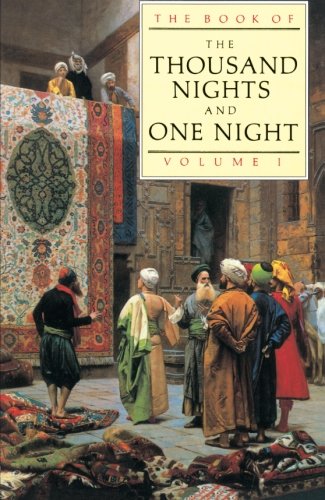
One of many different covers of various editions of this book, but almost certainly not the edition reviewed here.
One Thousand And One Nights is a book about love, wonder, magic, and morality. About genies, ape-people, and rhinoceroses who run around with elephants impaled on their horns. About how to use indexical uncertainty to hack the simulation running the universe to return the outcome you want. But most of all, it’s a book about how your wife is cheating on you with a black man.
Nights stretches from Morocco to China, across at least four centuries — and throughout that whole panoply of times and places, your wife is always cheating on you with a black man (if you’re black, don’t worry; she is cheating on you with a different black man). It’s a weird constant. Maybe it’s the author’s fetish. I realize that Nights includes folktales written over centuries by dozens of different people — from legends passed along in caravanserais, to stories getting collected and written down, to manuscripts brought to Europe, to Richard Burton writing the classic English translation, to the abridged and updated version of Burton I read. But somewhere in that process, probably multiple places, someone had a fetish about their wife cheating on them with a black man, and boy did they insert it into the story.
Our tale begins in Samarkand. One day the king, Shah Zaman, comes home unexpectedly and sees his wife cheating on him with a black man. He kills her in a rage, then falls sick with grief, and is taken to the palace of his brother, King Shahryar of Persia. While there, he sees King Shahryar’s wife cheat on him with a black man. He tells King Shahryar, who kills his wife in a rage too, then also falls sick with grief. The two grief-stricken kings decide to wander the world, expecting that maybe this will help in some way.
They come across a mighty king of the genies, and the brothers hide lest he see them and kill them. The genie falls asleep, and the genie’s wife finds them and demands they have sex with her or she’ll kill them. They have sex, and all the while, the genie’s wife is boasting about how even the king of the genies can’t prevent his wife from cheating. The two kings find this experience salutary — apparently the problem isn’t specific to them, it’s just an issue with the female sex in general. So they go back to the palace and everyone lives happily ever … no, actually, King Shahryar vows that he will bed a new woman every night, then kill her the following morning, thus ensuring nobody can ever cheat on him again.
So for however many years, King Shahryar beds a new woman every night, then kills her in the morning. After a while the kingdom begins to run dangerously low on women. The vizier frets over this, and his daughter Scheherazade hears him fretting. She develops a plan, and volunteers to be the king’s victim that night. After having sex, she tells the king a story. At the end, she says it’s too bad she’s going to die the next morning, because she knows other stories which are even better. Perhaps if the king spared her life for one night she could tell some of those too.
(I’d always heard that she leaves him at a cliff-hanger and makes him spare her to find out how it ends, which I think makes a better story, but this isn’t how the real Arabian Nights works).
Scheherazade’s stories are set in an idealized Middle East. The sultans are always wise and just, the princes are always strong and handsome, and almost a full half of viziers are non-evil. Named characters are always so beautiful and skilled and virtuous that it sometimes gets used it as a plot device — a character is separated from his family member or lover, so he wanders into a caravanserai and asks for news of someone who is excessively beautiful and skilled and virtuous. “Oh yes,” says one of the merchants, “I talked to a traveler from Cairo who said he encountered the most beautiful and skilled and virtuous person he’d ever seen in a garden there, he couldn’t shut up about them for days” — and now you know your long-lost brother must be in Cairo. In one case, a woman went searching for her long-lost son, tasted some pomegranate jam in Damascus, and immediately (and correctly!) concluded that only her son could make pomegranate jam that good. She demanded to know where the merchant had gotten the jam, and the trail led to a happy reunion.
The most common jobs in Idealized Middle East are sultan, merchant, poor-but-pious tailor, fisherman, merchant, evil vizier, sorcerer, merchant, thief, person who gets hired to assist a sorcerer because they have the exact right astrological chart to perform some otherwise-impossible ritual, and merchant. Of these, merchant is number one. Whatever else you’re doing — sailing, stealing, using your perfect astrological chart to enter a giant glowing door in the desert mysteriously invisible to everyone else — you’re probably also dealing goods on the side. The only exceptions are Moroccans (who are all sorcerers), Zoroastrians (who are all demonic cannibals), and Jews (who are all super-double merchants scamming everyone else). Also maybe the 5 – 10% of the Middle Eastern population who witches have turned into animals at any given time.

